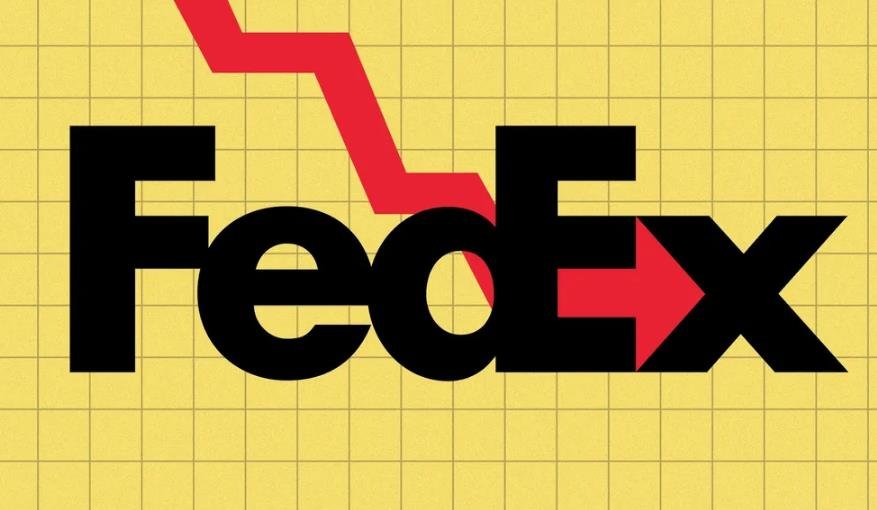FedEx, one of the world’s largest logistics companies, reported disappointing earnings and revenue for its fiscal second quarter on Tuesday, sending its shares down by more than 12%. The company also lowered its guidance for the full year, citing labor shortages, supply chain disruptions, and rising costs.
FedEx said it earned $2.72 per share on revenue of $22.6 billion, missing analysts’ estimates of $3.18 per share on revenue of $23.1 billion. The company also said it expects to earn between $14.40 and $15.40 per share for the fiscal year 2024, down from its previous range of $16.30 to $17.60 per share.
The company blamed the weak results on several factors, including the impact of Hurricane Ida, which disrupted its operations in the U.S. Gulf Coast, the ongoing Covid-19 pandemic, which reduced air cargo capacity and increased fuel prices, and the global chip shortage, which affected its vehicle fleet and customer demand.

FedEx also said it faced challenges in hiring and retaining workers, especially drivers and package handlers, amid a tight labor market. The company said it increased wages and incentives, but still struggled to fill positions and meet service levels.
FedEx warns of a worldwide recession
FedEx’s performance is often seen as a bellwether for the general economy, as it reflects the demand for goods and services across various sectors and regions. Therefore, when FedEx issued a bleak outlook, it was a warning for investors and policymakers that the global recovery may be losing momentum.
FedEx CEO Raj Subramaniam said on CNBC’s “Mad Money” that the company is a “reflection of everybody else’s business” and that he expects a “worldwide recession” in the near future. He said the company is facing “unprecedented challenges” and “unpredictable volatility” in the global environment.
Subramaniam said the company is taking actions to improve its profitability and efficiency, such as closing offices, parking planes, reducing expenses, and investing in technology. He also said the company is optimistic about the long-term growth opportunities, especially in e-commerce, which has been a key driver of its revenue during the pandemic.
However, Subramaniam’s comments spooked the market, as they suggested that the global economy may be heading for a slowdown or even a contraction, amid rising inflation, supply chain bottlenecks, and the emergence of new Covid-19 variants.
Market reacts to FedEx’s warning
FedEx’s warning triggered a market sell-off on Wednesday, as investors feared that the global economy may be losing steam and that corporate earnings may suffer. The S&P 500 index fell by 1.47%, its largest decline in one session since September. The Dow Jones Industrial Average dropped by 1.31%, while the Nasdaq Composite slid by 1.34%.
The transportation sector, which includes FedEx and its rivals, was among the worst performers, as it is sensitive to changes in economic activity and consumer spending. The Dow Jones Transportation Average, which tracks 20 transportation companies, plunged by 2.64%, its biggest drop since June.
Other sectors that rely on global trade and demand, such as energy, materials, and industrials, also suffered losses, as they faced the risk of lower revenues and higher costs. The energy sector was the worst performer in the S&P 500, falling by 3.36%, as oil prices declined amid expectations of lower demand.
Meanwhile, sectors that are seen as more defensive and stable, such as utilities, health care, and consumer staples, outperformed the broader market, as they offer higher dividends and lower volatility. The utilities sector was the only one in the S&P 500 that ended the day in positive territory, rising by 0.18%.
Analysts weigh in on FedEx’s warning
Analysts had mixed reactions to FedEx’s warning, as some saw it as a sign of the global economy’s weakness, while others attributed it to the company’s own shortcomings. Some analysts also questioned the company’s ability to achieve its long-term goals, given the current challenges and uncertainties.
Some analysts said FedEx’s warning reflected the global economy’s slowdown and the impact of the Covid-19 pandemic, which have affected many industries and regions. They said the company’s results and outlook were consistent with the recent data and forecasts that showed a moderation in growth and a rise in inflation.
For example, Morgan Stanley analyst Ravi Shanker said in a note that FedEx’s warning was “not a surprise” and that it confirmed the “global slowdown thesis” that the bank has been advocating. He said the company’s results were “in line with the broader macro data” and that the company’s guidance was “realistic”.
Other analysts said FedEx’s warning was more related to the company’s own problems and its failure to adapt to the changing market conditions. They said the company lagged behind its competitors, such as UPS and DHL, in terms of service quality, cost efficiency, and innovation.
For instance, Bank of America analyst Ken Hoexter said in a note that FedEx’s warning was “self-inflicted” and that it showed the company’s “lack of execution”. He said the company’s results were “disappointing” and that the company’s guidance was “unrealistic”.
